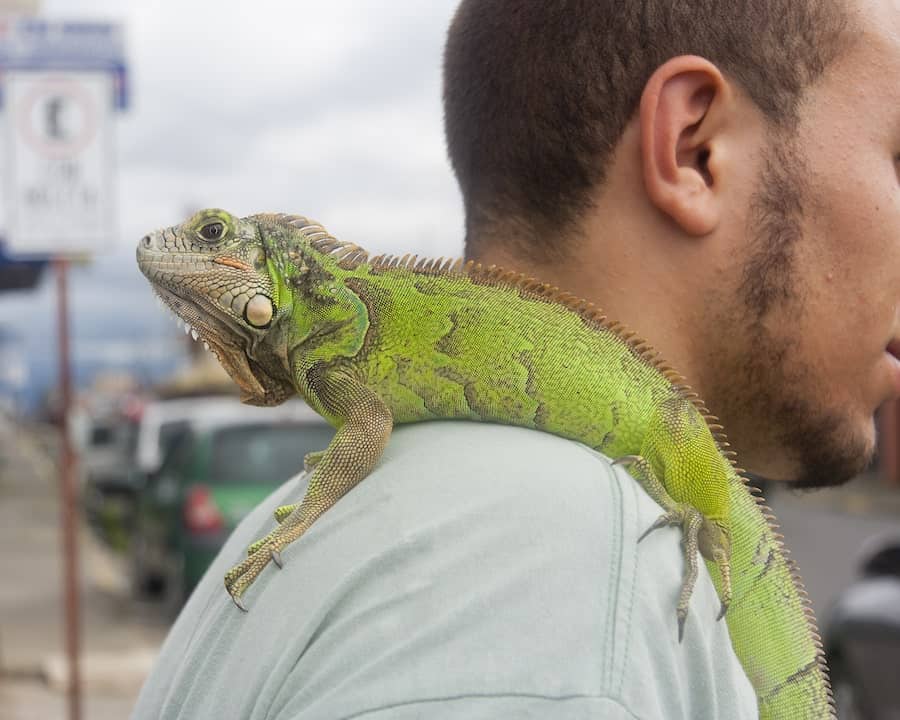You may be wondering what an iguana is trying to communicate when it hisses, and what to do about it. How you should react depends on whether the iguana is feral or a pet, it’s age, and whether it is used to being handled or not.
As a general rule, iguanas hiss when they are angry. The hissing is a final warning to other animals or people to back off. If provoked, the iguana will not hesitate to attack via a tail whip or bite.
In this blog, you’ll learn what to do when you hear your lizard making hissing noises and how to read its body language when it is feeling defensive or aggressive.
Why Do Iguanas Hiss?
Due to the shape of their jaw and the fact that they have no vocal cords, iguanas are very limited in the range of sounds they can make.
Air forcing its way across the glottis, an organ at the base of the throat, is responsible for the iguana’s hissing sound.
While small lizards are usually mute, some species, like geckos, are noisy and make chirps, clicks, and squeaks.
Some large-sized reptiles, like iguanas, are limited to making sounds like hissing and clicking, which they use to deter encroaching threats in their space.
The simple fact is that your iguana feels vulnerable or aggressive when it hisses, and more than likely, wants to be left alone.
Making a threatening sound is how iguanas warn other predators and competitors in the wild that they are prepared to bite. The same behavior applies to an unfamiliar person or a rough and careless handler.
Are Hissing Iguanas Potentially Harmful?

Although iguanas are, for the most part, harmless herbivores, they can nevertheless deliver a nasty bite as their sharp serrated teeth and super strong jaws can clamp down with immense force.
Iguanas have a total of about 80-120 teeth, which they use to shred plant material. If provoked, and if you ignore your pet’s warning signals, you may incur a wound needing surgery and/or stitches.
Furthermore, feral iguanas found in countries like Mexico, South America, and southern parts of the US, where they are considered native species, often carry harmful bacteria called salmonella that can cause a gastro-intestinal illness called salmonellosis.
Young children under the age of five, pregnant women, and the elderly are very susceptible to Salmonella, which is why they should never handle iguanas or their drinking or swimming water.
What Should I Do if an Iguana Hisses at me?
As previously mentioned, iguanas hiss when they feel threatened, whether they are pets or feral. Here is what to do when you hear your iguana make hissing sounds.
If you’d like to learn more in-depth about why iguanas can be dangerous, check out this post I wrote titled, “Are Iguanas Dangerous? Not Your Average Pet.”
Feral Iguana

Never approach or try to touch a feral iguana, whether it is hissing or not, as it may carry the Salmonella bacteria. I think it’s safe to say that it would be unwise to risk an infection which may require a hospital visit.
Should you encounter a hissing iguana in the outdoors, do your best to avoid it and never try touching or picking it up.
Pet Iguana

Get to know your pet iguana and learn to read its body language. Iguanas can have markedly different characters depending on whether they are purchased young and already accustomed to being handled, or if they are older and more mature.
Male lizards may be more aggressive than females, and iguana pets can become distrustful after being mistreated.
Consider any hissing a sign of defense or aggression, and avoid touching or holding your iguana until it has calmed down, stopped hissing, and relaxed its dewlap.
Do All Iguanas Hiss?

Although iguanas’ aggressive traits increase as they mature and become sexually active, they’re known to hiss as early as their hatchling phase.
A young lizard may hiss less often because it is intimidated by new surroundings, new owner, or a more dominant male in its enclosure.
Iguanas may close both eyes to pretend you are not in proximity, or close one eye to avoid looking at you. Lastly, iguanas may attempt to flatten themselves as much as possible in an attempt to hide.
As an iguana matures, especially if it is male, it may become aggressive. However, both males and females are known to hiss.
8 More Warnings Displayed by a Hissing Iguana
Because reptiles have a limited verbal repertoire, they employ body language, posture, and stance to communicate to the threat that it is not afraid to defend itself, its food, eggs, or its nest.
The following behaviors or postures are indicators of an angry and aggressive iguana:
- Your pet is hissing with a wide-open mouth, showing its serrated teeth
- The tongue is curved or arched – and it looks as if your pet is smiling. (it’s not.)
- The dewlap, a flap of scaly skin under an iguana’s neck primarily used to regulate the lizard’s body heat, is rigid and extended. (A male iguana will also puff out his dewlap to impress a female during a mating ritual, a time when he will be more aggressive)
- The iguana’s tail either rattles or thrashes.
- Your pet bobs its head vigorously, and maybe also stands on its two hind legs.
- Your iguana raises its crest with the spines pointing upwards
- The animal compresses its body inward, making it look less round and compact, drawing its body up to look taller.
- The iguana is strutting with a compressed body and its crest raised high.
It’s crucial that you learn to identify all the cues of an angry iguana if you wish to keep yourself injury free. Therefore, check out this post I wrote titled, “7 Signs An Iguana is Mad: Ignore At Your Peril.“

